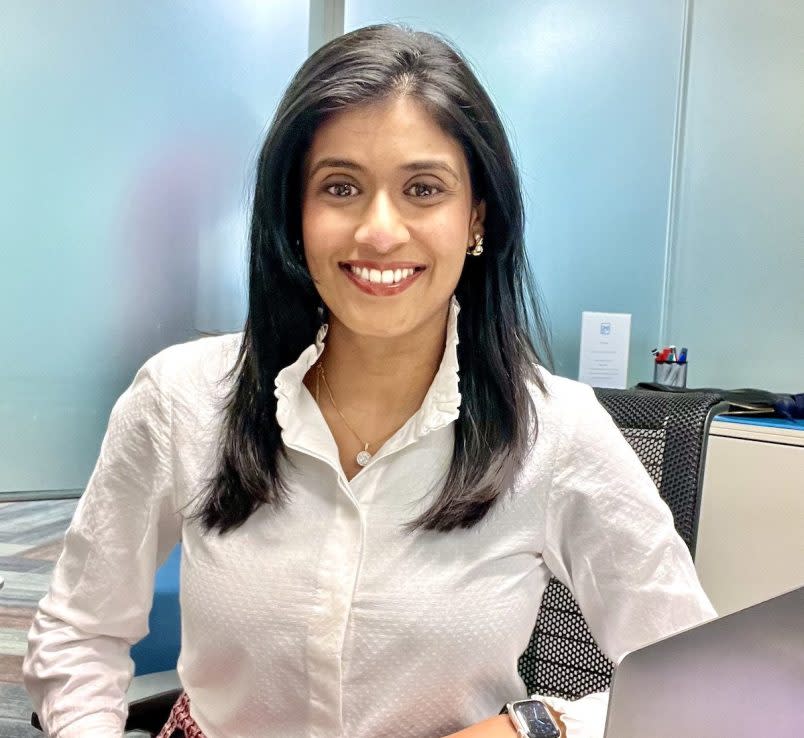Built, test, repeat: Meet the scientist-turned-entrepreneur by accident

Jennifer Sieg meets with scientist-turned-entrepreneur Madusha Peiris for Ambition A.M.’s latest founder spotlight to see what she’s learned on her journey so far. Turns out, entrepreneurship is not always easy — but it is fun.
Build, test, repeat – rejection – build, test, repeat.
Sound familiar? Then you’re probably aware of how science, or entrepreneurship, works.
Madusha Peiris might be in the very early stages of her entrepreneurial career, having founded her weight loss product development company Enterika in 2021, but she seems to already know quite a bit about how business and innovation work.
“I call it ‘entrepreneur by accident,’” she says, smiling.
Peiris founded Enterika after a decade of research at Queen Mary University, where the scientist-turned-entrepreneur now spends some 60 per cent of her time as a senior lecturer.
The other 40 per cent, she says, is spent learning how to build a business out of her findings, which she believes can place Enterika well on its way to becoming a “major” disrupter in the £4.8bn a year anti-obesity market.
How it works
Traditionally, weight loss pills work by using a drug that makes you feel less hungry or full.
“You’re probably starting to feel hungry right now,” Peiris chuckles.
However, Peiris and her colleagues discovered a way to do it drug-free with a nutrient-based approach.
“I really like knowing why things happen and how things happen,” Peiris says.
I really like knowing why things happen and how things happen.
Madusha Peiris
“When we started making a discovery, we thought, hang on a second, this might have commercial potential.”
Naturally, as most researchers do, she started asking questions.
Is this patentable? Would it have commercial potential? Would we be able to secure the funding needed to further our plans and testing trials?
Once they secured a patent, the foundations for a business began to form quickly.
Like any successful new start-up, having a strong product first and foremost can help you hit the ground running.
“Having a patent and pursuing a patent application was one of the first things we did and so now we have patents in Europe, in the US, and in India, that protects our intellectual property and our product as well,” she says.
“In science, and especially actually even in business, to protect your idea so people can’t copy it is almost critical. Otherwise you don’t have a niche, you don’t have a niche product.”
Now, after receiving a £50,000 ‘Unlocking UK Potential’ grant from Innovate UK, Enterika has entered its seed funding round to complete a Phase II study in obese volunteers and Phase I study in Type 2 Diabetes patients.
Entrepreneur by accident
Peiris laughs – a lot – when I ask whether she’s always wanted to become an entrepreneur.
“No,” she says, still laughing, “I didn’t even think that it was possible at all.”
What was possible, however, was finding a product that worked and having the patience needed to perfect it.
“So I didn’t necessarily think we were going to have a business but I always thought let’s try and turn our research into something that actually can be used to treat patients or treat a population of people who need help,” Peiris adds.
“How can we apply this to the real world?”
As an ‘accidental entrepreneur,’ you have to be prepared to shift your focus elsewhere.
Developing a strong product might help lay the groundwork, but it’s not always enough to reach a business’s full potential.
What’s next for Peiris and the business?
“I currently work 40 per cent of my time – technically – for the company [and] I will be taking it to 80 per cent,” she says.
“Because as the founder and the chief visionary, if you will, I am really well placed to push everything forward and right now, it’s very scientifically driven.”
Peiris smiles when she tells me she’s had her fair share of rejections, but taking the ‘no’s’ lightly is crucial to learning from those inevitable early on challenges.
“There’s always going to be somebody who says ‘no’, somebody who says ‘not possible’, or puts a handle in front of you,” she adds.
“I’ve had many – honestly a lot – and I think the only thing that’s helped is just kind of turning a blind eye to it.”
And, as the anti-obesity market is expected to grow to up to £80bn by 2030, not taking no for an answer might just be the right thing for the entrepreneur to do.
CV
Name: Madusha Peiris
Company: Enterika Ltd
Founded: 2021
Staff: 4 currently (will be doubling in June)
Title: Founder and CSO at Enterika; Senior Lecturer and Group Leader in Enteric Neurobiology at Queen Mary University of London
Age: 41
Born: Colombo, Sri Lanka (and raised in Australia)
Lives: Notting Hill (London)
Studied: BSc (Hons), PhD from University of Queensland, Australia
Talents: Quips and witticisms (or so I like to think!)
Motto: Keep persisting and persevering as daily efforts lead to lifetime achievements
Most known for: patience and resilience
First ambition: To be a useful and productive human being
Favourite book: Tough one but recently, ’The Covenant of Water’
Best piece of advice: Be committed to and fully immersed in the present because when you focus on what is happening right now, and omit noise from the past and delusions of the future, amazing discoveries can be made.

 Yahoo Finance
Yahoo Finance 